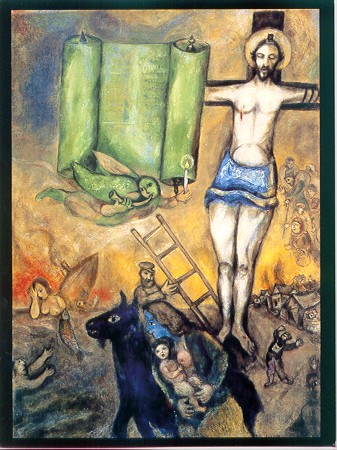Awadhesh Kumar Singh supplied this week’s Question:
Why could Jesus not show the miracle of being saved from being crucified? Surely, he expected to be saved, as his last words show: “God, God, why have you forsaken me?”
As usual, the commentary was great — although I think that some of you formerly Christian commenters have pretty much run out the string on your lines of argument. Saying we don’t need a crucifixion or a resurrection may be satisfying to you, but it’s clearly unsatisfying to most of us.
Let me start my answer to Awadhesh’s question, with a story (if the story bores you, skip to my points at the end):
Polycarp was the Bishop of Smyrna in the mid-second century. At 86 years old, he was arrested and told by the Roman proconsul that he’d be released if he simply swore an oath to the emperor and cursed Christ. He refused and was taken to the arena to be killed, whereupon he heard a voice from heaven saying, “Be strong, Polycarp, and play the man!”
Again, the proconsul pressed him:
“Take the oath, and I shall release you. Curse Christ.”
Polycarp said: “Eighty-six years I have served him, and he never did me any wrong. How can I blaspheme my King who saved me?”
The Martyrdom of Polycarp continues the story,
Then these things happened with such dispatch, quicker than can be told—the crowds in so great a hurry to gather wood and faggots from the workshops and the baths, the Jews being especially zealous, as usual, to assist with this. When the fire was ready, and he had divested himself of all his clothes and unfastened his belt, he tried to take off his shoes, though he was not heretofore in the habit of doing this because [each of] the faithful always vied with one another as to which of them would be first to touch his body. For he had always been honored, even before his martyrdom, for his holy life. Straightway then, they set about him the material prepared for the pyre. And when they were about to nail him also, he said: “Leave me as I am. For he who grants me to endure the fire will enable me also to remain on the pyre unmoved, without the security you desire from the nails.”
Polycarp continued to preach the gospel, even as the wood and faggots were lit. Then this happened,
And when he had concluded the Amen and finished his prayer, the men attending to the fire lighted it. And when the flame flashed forth, we saw a miracle, we to whom it was given to see. And we are preserved in order to relate to the rest what happened. For the fire made the shape of a vaulted chamber, like a ship’s sail filled by the wind, and made a wall around the body of the martyr. And he was in the midst, not as burning flesh, but as bread baking or as gold and silver refined in a furnace. And we perceived such a sweet aroma as the breath of incense or some other precious spice.
At length, when the lawless men saw that his body could not be consumed by the fire, they commanded an executioner to go to him and stab him with a dagger. And when he did this a dove and a great quantity of blood came forth, so that the fire was quenched and the whole crowd marveled that there should be such a difference between the unbelievers and the elect. And certainly the most admirable Polycarp was one of these [elect], in whose times among us he showed himself an apostolic and prophetic teacher and bishop of the Catholic Church in Smyrna. Indeed, every utterance that came from his mouth was accomplished and will be accomplished.
Did you get that? When they burned him at the stake, he didn’t burn. Instead, he smelled of incense. So they sliced open his chest with a sword and a dove flew out.
In my industry, this is called hagiography, a very common form of religious literature. Had a host of angels descended from heaven and rescued Jesus from the Cross, his death would have fallen into this genre of literature, rather than into the Gospel genre. That’s my first point: It would have been totally expected for the story to end with Jesus being rescued from the Cross.
My second point is that some early Christians did, indeed, believe that Jesus was rescued from the Cross — or at least that his divinity was. The Docetists thought that Jesus’ human body was only an apparition — they were so scandalized by the thought that God would become a meat puppet that they recast the incarnation and the crucifixion as little more than a magic trick. Other early churchers thought that Jesus’ divinity was vacuumed from his body by the Father just moments before his body died, thus ensuring that God would not experience death. But, I ask, if God didn’t experience death, then what’s the point of the crucifixion?
My final point is a related, theological point: the crucifixion of Jesus of Nazareth, who was incarnate of God, shows God’s ultimate solidarity with all of humanity. This is a theme that I have reiterated many times on this blog. It’s the keystone of my entire theological system.
When I write in the headline that Jesus didn’t rescue himself from the Cross because he couldn’t, I mean this in two ways: 1) While Jesus of Nazareth was empowered by the Holy Spirit to perform miracles, this clearly didn’t extend to Superman like powers — Jesus didn’t fly or make time stand still; this isn’t how his miraculous abilities worked. And this would have subverted the reason for miracles: the miracles of Jesus were not magic tricks meant to exhibit his divinity but signs of the coming Kingdom of peace and healing.
And 2) Had he been rescued from the Cross, God would have lost the opportunity to experience death. And it’s God’s experience of death that is the key to our salvation.












